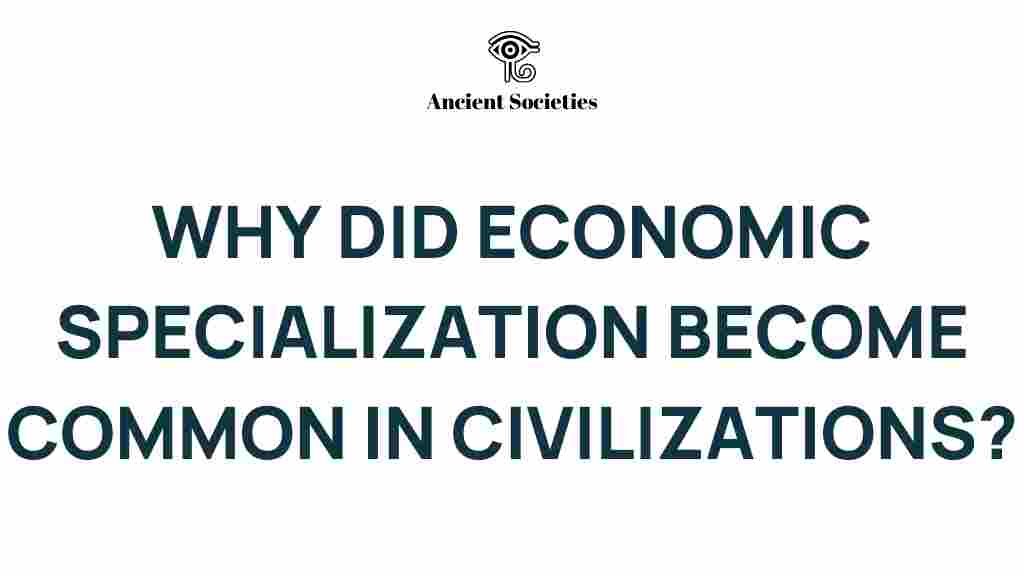Unraveling the Mystery: Why Economic Specialization Thrived in Civilizations
Economic specialization is a fascinating phenomenon that has significantly shaped the course of human history. As civilizations developed, many societies began to focus on specific sectors of their economies, leading to remarkable advancements in trade, labor division, and societal development. This article delves into the essence of economic specialization, exploring its historical context, its impact on ancient societies, and the factors that facilitated its growth.
The Historical Context of Economic Specialization
Throughout history, economic specialization has played a pivotal role in the advancement of civilizations. When societies moved from subsistence farming to more complex economies, they began to recognize the benefits of specialization. This transition allowed individuals and communities to produce goods more efficiently and to trade these goods with others. Understanding this historical context is crucial for grasping how economic specialization influenced various aspects of life in ancient societies.
- Early Agricultural Societies: Initially, most communities relied on subsistence agriculture, where families produced most of what they needed.
- Trade Networks: As populations grew, the need for trade networks emerged, allowing for the exchange of surplus goods.
- Urbanization: The rise of cities facilitated specialization, as people moved into urban areas seeking better opportunities.
The Role of Trade in Economic Specialization
Trade is a critical component of economic specialization, acting as a catalyst for its growth. When civilizations engaged in commerce, they found that focusing on producing certain goods gave them a competitive advantage. Here’s how trade promoted economic specialization:
- Access to Resources: Different regions had varying resources, making trade essential for acquiring goods that were not locally available.
- Market Expansion: By specializing in certain products, civilizations could tap into broader markets, increasing demand for their goods.
- Innovation and Improvement: Competition in trade encouraged societies to innovate, improving production techniques and product quality.
Labor Division and Its Impact on Societal Development
One of the most significant outcomes of economic specialization is the division of labor. When individuals focus on specific tasks, they become more skilled and efficient in their work. This division of labor not only boosts productivity but also fosters societal development. Here’s how:
- Increased Efficiency: Specialization allows workers to become adept at their tasks, leading to faster and more efficient production.
- Innovation: As workers focus on specific areas, they are more likely to develop new techniques and technologies, further enhancing productivity.
- Social Structure: Economic specialization contributed to the formation of distinct social classes and roles within civilizations.
Examples of Economic Specialization in Ancient Societies
Throughout history, numerous ancient societies exemplified economic specialization. Here are some notable examples:
- Mesopotamia: Known as the cradle of civilization, Mesopotamia saw the rise of specialized trades such as pottery, metallurgy, and textiles.
- Ancient Egypt: The Egyptians excelled in agriculture, building, and trade, with a strong focus on the production of grain and luxury goods.
- Indus Valley Civilization: This society specialized in crafts, including bead-making and metallurgy, and had an extensive trade network with neighboring regions.
Factors Contributing to Economic Specialization
Several key factors contributed to the thriving of economic specialization in ancient civilizations:
- Geographical Advantages: Access to fertile land, water sources, and trade routes played a critical role in the development of specialized economies.
- Technological Advances: Innovations in farming, transportation, and production techniques allowed societies to increase output and efficiency.
- Political Stability: Strong governance and stable political environments fostered trade and economic growth.
Challenges and Troubleshooting Economic Specialization
While economic specialization brought numerous benefits, it also presented challenges. Here are some common issues and troubleshooting tips:
- Resource Dependence: Specializing in a narrow range of goods can make societies vulnerable to resource depletion. Diversifying production can mitigate this risk.
- Market Fluctuations: Economic downturns can impact specialized sectors heavily. Establishing safety nets and alternative markets can provide stability.
- Social Inequality: Specialization can lead to disparities in wealth and power. Implementing equitable policies and opportunities for all can help address these issues.
The Legacy of Economic Specialization in Modern Economies
Today, the principles of economic specialization remain relevant. Modern economies are characterized by a high degree of specialization, with industries focusing on specific sectors. This has led to:
- Global Trade: The interconnectedness of economies has amplified the benefits of specialization on a global scale.
- Technological Innovation: Modern industries continue to push the boundaries of efficiency and production, a direct descendant of ancient practices.
- Labor Markets: The division of labor in contemporary economies mirrors the specialization seen in ancient societies.
Conclusion
In conclusion, economic specialization has been a driving force in the development of civilizations throughout history. By focusing on specific sectors, societies have enhanced their trade, improved productivity through labor division, and fostered societal development. As we reflect on the past, it is clear that the lessons learned from ancient societies continue to inform our modern economies. Understanding the intricate relationship between economic specialization, trade, and societal development offers valuable insights for future generations.
If you want to explore more about the impact of trade on civilizations, check out this detailed study. For more historical insights, feel free to visit our resources.
This article is in the category History and created by AncientSocieties Team

1 thought on “Unraveling the Mystery: Why Economic Specialization Thrived in Civilizations”